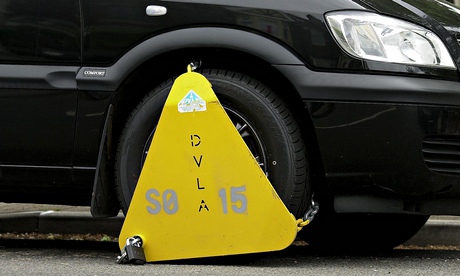
Has there been a sudden 60%-plus increase in the number of drivers who are choosing to break the law and not tax their cars? Of course there hasn’t. Yet figures released to Guardian Money by the DVLA reveal that the number of cars clamped for tax infringements has leaped since October 2014 – up from about 5,000 vehicles a month to more than 8,000. It means that around 100,000 people will be clamped this year by the DVLA compared with 60,000 the year before.
Many, if not most, of these drivers who will see their vehicle clamped and towed away will previously have been entirely law -abiding when it comes to taxing their cars. But they will be caught out by poorly introduced rules from the DVLA.
Most of us know by now that it is no longer necessary to display a tax disc on a car window. But at the same time as the disc rules were changed in October the DVLA also changed the law when it comes to selling a car. The deeply ingrained practice among drivers selling a used car – seen in adverts saying a car is “taxed and MOTd” to a particular date – has been thrown out, and instead the new buyer has to tax the car even if there was several months still outstanding on the previous owner’s tax.
How much is the DVLA raking in from its clamping spree? One reader told us of his £827 charge – made up of a release fee (£200), storage fee (£462) and an out of court settlement of £165. He also had to stump up a surety fee of £160, later returned. This level of charges is enough to tip many people over the financial edge. Even if the average fee paid by motorists clamped by the DVLA is closer to £350, it suggests the agency is pulling in around £15m in extra income from clamping.
Our story this week is not the first time we have highlighted the problem, as we have featured individual tales in our Consumer Champions column. The response from readers is interesting. Half of you suggest, not entirely unreasonably, that it is the driver’s responsibility to read the DVLA letters which have informed owners about the change, and that ignorance is no defence. But the other half are totally bemused to discover there has even been a rule change on tax.
Where the DVLA is at fault is having introduced two changes at one time. The message about displaying tax discs was widely reported in the media, but the message about tax expiring on sale of the car was not. To make matters worse, confusion reigns over whether drivers of now untaxed vehicles are being warned they will be clamped. DVLA officials tell us that letters will go out to recent car buyers telling them that their car is untaxed and they must act immediately or face being clamped and towed away. But Guardian Money readers who have been clamped say they never received these letters. One says the letter of warning only arrived after they had been clamped. This is a mess created by the DVLA and needs to be sorted out urgently.
• Britain’s new car sales figures are extraordinary. Last month, sales were a record 492,774, up 6% on what was already a buoyant March 2014. Much of it is fuelled by personal contract plans that allow you to drive away in a shiny new vehicle for just £200 or so a month.
In the US, there are fears that an explosion of car credit is the next sub-prime accident waiting to happen. There is little evidence of that here, but I was intrigued to see an acquaintance who I know to be in bad debt turn up with a spanking new top-of-the-range Ford. It turns out he applied for a small personal loan to buy a secondhand car, but was rejected by his bank. Yet the PCP company was happy to finance the purchase of a much pricier car (and tie him into even more monthly obligations.) Maybe this is uncommon, but given that wages are barely rising it is a mystery as to what is supporting car sales, other than risky lending practices.

